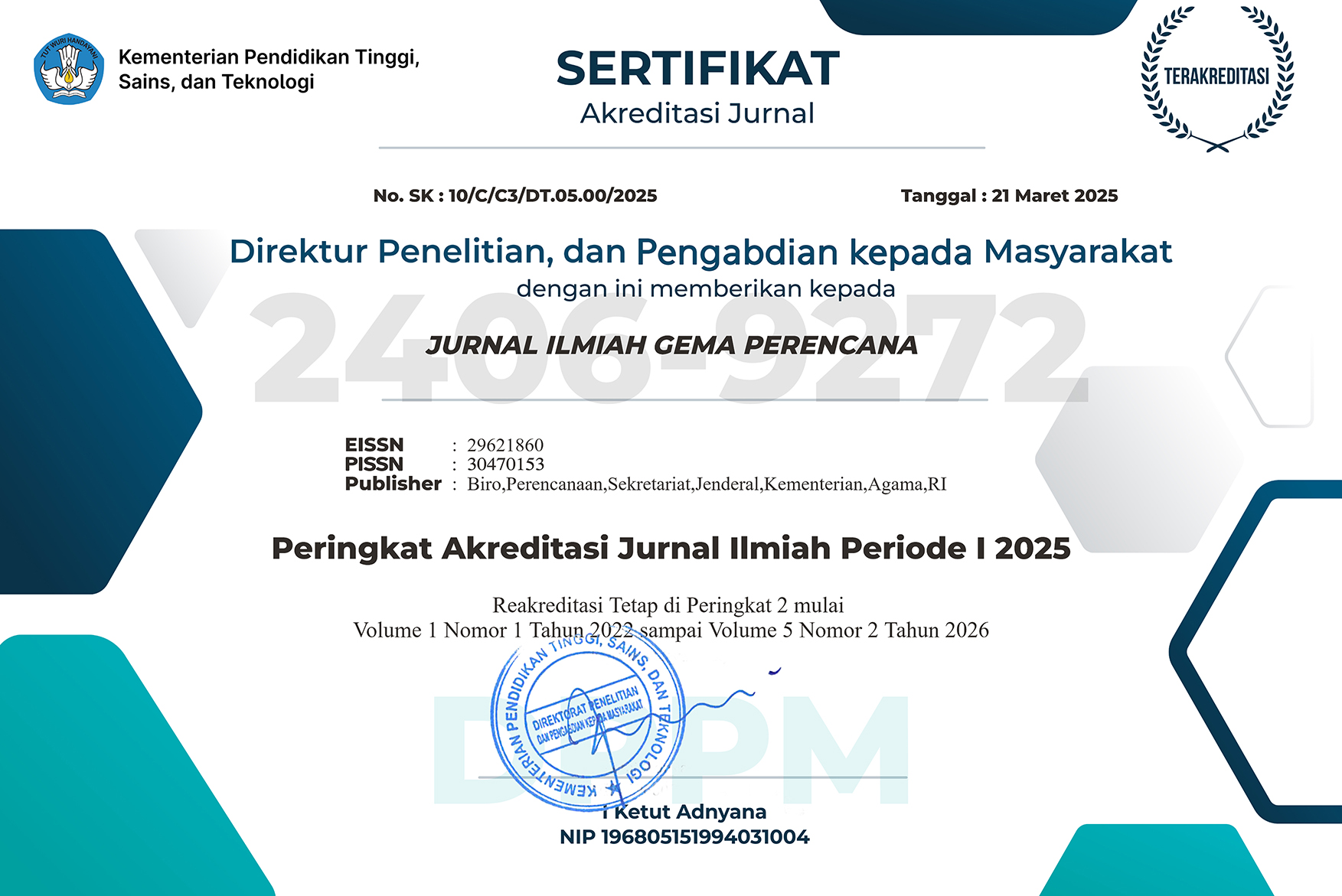Strategic Policy: Transformation of the North Sumatra Regional Office of the Ministry of Religious Affairs Towards Ecotheologically Conscious Governance
DOI:
https://doi.org/10.61860/jigp.v4i2.313Abstract
This policy study aims to analyze the failure of the Ecotheology program implementation in bureaucratic governance (good governance) within the Regional Office of the Ministry of Religious Affairs (Kanwil Kemenag) of North Sumatra Province and recommend appropriate regulatory solutions. The main issue identified is the failure of Kanwil Kemenag to realize environmentally conscious governance due to the low internalization of Ecotheology values among the State Civil Apparatus (ASN), exacerbated by weak leadership role models and inconsistent Green Office culture. The writing method used is Qualitative Policy Analysis with a descriptive-prescriptive approach. The descriptive approach is used to identify the root of the problem through Root Cause Analysis and Evidence Synthesis techniques (regulation analysis and internal reports), while the prescriptive approach is used to formulate recommendations. For evaluation of policy alternatives, William N. Dunn's Alternative Policy Criteria Scoring theory is used (Effectiveness, Efficiency, Equity, Acceptability) to ensure the feasibility of solutions. The results of the analysis indicate that the root of the problem lies in cultural pathology and leadership crisis, not in the absence of a program, as evidenced by the highest score on the issue of internalization of values. Based on the Dunn criteria evaluation, the best policy alternative is regulatory intervention at the value level.
Downloads
References
Abdushomad, M. A. (2025, 24 Juni). Ekoteologi dan Refleksi Kepemimpinan Menteri Agama dalam Merawat Bumi. Kementerian Agama Republik Indonesia.
Bardach, E., & Patashnik, E. M. (2020). A Pactical Guide for Policy Analysis: The Eightfold Path to more Effective Problem Solving (6th ed.). CQ Press.
Christensen, T., & Lægreid, P. (2007). The Whole-of-Government Approach to Public Sector Reform. Public Administration Review, 67(6), 1085-1090.
Dewi, L. K. (2025). Implementasi Ekoteologi dalam Pembentukan Karakter Religius Murid di Adi Widyalaya Gurukula Bangli. Jurnal Gringsing Agung, 1(1), 9.
Dunn, W. N. (2018). Public Policy Analysis: An Integrated Approach (6th ed.). Routledge.
Dwiyanto, A. (2011). Mengembalikan Kepercayaan Publik Melalui Reformasi Birokrasi. Gramedia.
Hamdi, A. Z. (2025, 27 Mei). Internalisasi Core Value BerAKHLAK dalam spirit Ecotheology for Unity. Badan Litbang dan Diklat Kementerian Agama RI.
Haq, F. (2020). Fikih Lingkungan Hidup: Upaya Konservasi Alam Berbasis Ajaran Islam. Jurnal Ilmiah Syari’ah, 19(1), 1-18.
Indonesia. (1945). Undang-Undang Dasar Negara Republik Indonesia Tahun 1945.
Indonesia. (2009). Undang-Undang Republik Indonesia Nomor 32 Tahun 2009 tentang Perlindungan dan Pengelolaan Lingkungan Hidup. Lembaran Negara Republik Indonesia Tahun 2009 Nomor 140.
Indonesia. (2014). Undang-Undang Republik Indonesia Nomor 5 Tahun 2014 tentang Aparatur Sipil Negara. Lembaran Negara Republik Indonesia Tahun 2014 Nomor 6.
Itjen Kemenag. (2025, 21 Agustus). Penguatan GRC, Energi Baru Reformasi Birokrasi. Kementerian Agama Republik Indonesia.
Kementerian Agama RI. (2025). Keputusan Menteri Agama Nomor 244 Tahun 2025 tentang Program Prioritas (Asta Protas) Kementerian Agama.
Kementerian Agama RI. (2025). Surat Edaran Sekretaris Jenderal Kemenag Nomor SE 27 Tahun 2025 tentang Gerakan Kementerian Agama Aman, Sejuk, Rindang, dan Indah (ASRI).
Kharlie, A. T. (2025, 3 Oktober). Substansi Ekoteologi dalam Modernisasi Jepang. Kementerian Agama Republik Indonesia.
Kotter, J. P. (1996). Leading Change. Harvard Business School Press.
Nasr, S. H. (2018). Man and Nature: The Spiritual Crisis of Modern Man. Routledge.
Parsons, W. (2012). Public Policy: An Introduction to the Theory and Practice of Policy Analysis. Edward Elgar Publishing.
Prajadhita, I. P. W. (2025). Implementasi Ekoteologi dalam Pembentukan Karakter Religius Murid di Adi Widyalaya Gurukula Bangli. Jurnal Gringsing Agung, 1(1), 9.
Ramdhani, M. A. (2025, 25 Juni). Integrasi Nilai Spiritual dan Lingkungan, Kemenag Perkuat Kurikulum Pelatihan Ekoteologi. Badan Litbang dan Diklat Kementerian Agama RI.
Saenong, F. F. (2025, 23 Juli). Transformasi Moderasi Menuju Gagasan Ekoteologi untuk Selamatkan Bumi. Kementerian Agama Republik Indonesia.
Saleh, H. M. (2025, 12 September). Implementasi Ekoteologi, Kemenag Sultra Perkuat Gerakan ASRI. Sultrademo.co.
Schein, E. H. (2010). Organizational Culture and Leadership (4th ed.). Jossey-Bass.
Schlosberg, D. (2007). Defining Environmental Justice: Theories, Movements, and Nature. Oxford University Press.
Sebayang, D. A. (2025, 5 Agustus). Ekoteologi: Transformasi Kemenag dari Birokrasi Menuju Aksi Selamatkan Bumi. Islami.co.
Umar, N. (2025, 12 April). Kemenag Gencarkan Pelestarian Lingkungan Lewat Masjid, KUA, dan Wakaf Hutan. Kementerian Agama Republik Indonesia.
United Nations. (2006). Definition of Basic Concepts and Terminologies in Governance and Public Administration. UN-ESCAP.
Wamsler, C., & St. Clair, A. L. (2015). The Role of Governance in Urban Climate Adaptation: Considering the Green-Blue and Grey Dimension. Journal of Environmental Planning and Management, 58(12), 2115-2135.
Downloads
Published
How to Cite
Issue
Section
License
Copyright (c) 2025 Azizah Hanim Nasution

This work is licensed under a Creative Commons Attribution 4.0 International License.






